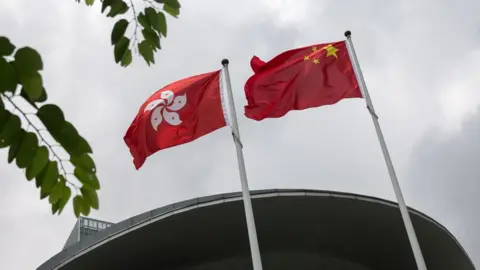Hong Kong: What is China's 'patriot' plan for electoral reform?
 EPA
EPAIn its latest move to tighten control over Hong Kong, China is pushing for a controversial "patriot" plan to reform the city's elections.
Beijing says the goal is to keep "unpatriotic" figures from positions of political power in Hong Kong.
But critics warn it would mean the end of democracy in Hong Kong, eradicating whatever opposition there is left.
What's the background?
Hong Kong used to be under British control, but was handed back to China in 1997 under a "one country, two systems" principle.
This was meant to protect certain freedoms for Hong Kong, which no other part of mainland China has: freedom of assembly and speech, an independent judiciary, and some democratic rights.
These freedoms are enshrined in Hong Kong's mini-constitution, the Basic Law, which was meant to last until 2047.
On 11 March, the "patriots governing Hong Kong" resolution was passed at the National People's Congress (NPC), paving the way for Beijing to amend annexes of the Basic Law.
On 30 March, the resolution passed the NPC's Standing Committee and could be enacted in Hong Kong within weeks.
How will it work?
Candidates for Hong Kong's parliament, the Legislative Council (LegCo) are to be nominated by the Election Committee, a powerful body which until now only elected the city's most senior official, the Chief Executive. This Election Committee, which is heavily pro-Beijing, will be expanded by 300 members from 1,200 to 1,500.
Any prospective MP, member of the Election Committee or candidate for Chief Executive will be vetted by a separate screening committee, making it easy to bar anyone deemed as being critical of Beijing.
There will also be changes to LegCo itself, diluting the influence of directly elected MPs.
While overall seats will increase from 70 to 90, the number of directly elected representatives will fall from 35 to 20.
Forty seats will go to MPs chosen by the Election Committee while 30 will be given to MPs elected by special interests such as business, banking and trade, which historically are also pro-Beijing.
Why is it being enacted?
The move appears to be a continuation of China's plan to tighten control over Hong Kong, following recent developments.
Huge pro-democracy protests took place in 2019, some of which turned violent. Later that year, pro-democracy groups made huge gains in local district council elections.
Since then, Beijing has passed a controversial national security law, which effectively reduces Hong Kong's autonomy and made it easier to punish demonstrators. Dozens of people have since been arrested under this law.
 Getty Images
Getty ImagesIn November 2020, several lawmakers were deemed threats to national security and dismissed - this led to the resignation of nearly all the city's pro-democracy lawmakers.
The developments underscore the rapid expansion of Beijing's influence in the territory, pushing for loyalty from all levels of power.
Critics, including the UK government, allege that China is now effectively undermining the "one country, two systems" principle with all these changes.
But Beijing says it is safeguarding its sovereignty, and rejects what it calls "foreign interference" in domestic affairs.
